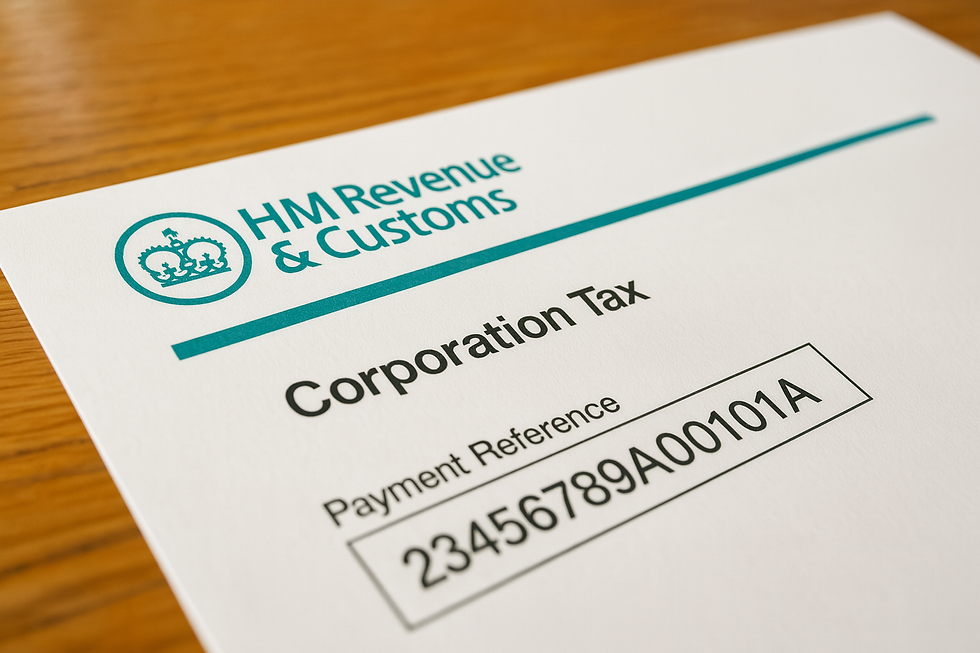Corporation Tax Explained
- Connor Thubron
- 3 days ago
- 4 min read
What It Is, Who Pays It & How It Works
If you’re running a limited company in the UK, understanding Corporation Tax is essential — not just to stay compliant, but to avoid costly mistakes and potentially save thousands.
In this guide, we’ll break down what Corporation Tax is, who it applies to, how much you’ll pay, and the key steps to filing and paying it correctly.

What Is Corporation Tax?
Corporation Tax is the tax your limited company pays on its profits.
Just like individuals pay Income Tax on their personal earnings, companies must pay Corporation Tax on:
Profits made from trading (selling goods or services)
Investment income (e.g., rental income or interest)
Unlike personal tax, there is no personal allowance for Corporation Tax. The moment your business makes profit, Corporation Tax applies.
Who Has to Pay Corporation Tax?
You’ll need to pay Corporation Tax if your business is:
A UK-based limited company
A foreign company with a UK office, branch, or trading activity
Certain clubs or unincorporated associations (like sports clubs or co-ops)
If you’re a sole trader or partnership, Corporation Tax doesn’t apply — you pay Income Tax instead. But the moment you incorporate your business as a limited company, Corporation Tax becomes your responsibility.
What Profits Are Taxable?
Corporation Tax is calculated on your taxable profits, which may include:
Trading profitsRevenue from your regular business activity, minus allowable business expenses.
Investment incomeAny profits from interest, dividends, or property rental income earned by the company.
HMRC allows you to deduct certain allowable expenses from your income to reduce your taxable profit — like salaries, software, rent, travel, accountancy fees, and more. Getting this part right is crucial to not overpaying tax.
How Much Corporation Tax Will You Pay?
As of April 2023, the UK has a tiered Corporation Tax system:
Annual Profit | Corporation Tax Rate |
£0 – £50,000 | 19% (small profits rate) |
£50,001 – £250,000 | Gradually increases via “marginal relief” |
Over £250,000 | 25% (main rate) |
So if your company makes £40,000 in profit, you’ll pay 19%.If it makes £300,000, you’ll pay 25% on most of it, with no relief.
If your company has associated companies (e.g. you run multiple businesses), these thresholds are split between them, which can push you into a higher rate bracket faster.
When Do You Have to Pay Corporation Tax?
Here’s where it gets a bit different from personal tax…
You don’t get a bill from HMRC.
Instead, as a company director or accountant, it’s your job to:
Work out your company’s taxable profit
Calculate how much Corporation Tax you owe
Pay it on time
Submit a Corporation Tax Return
Here are the key deadlines:
Task | Deadline |
Register for Corporation Tax | Within 3 months of starting to trade |
Pay Corporation Tax | Within 9 months + 1 day after your year-end |
File Company Tax Return (CT600) | Within 12 months after your year-end |
Example: If your company year ends on 31st March 2025:
Your Corporation Tax payment is due by 1st January 2026
Your CT600 return is due by 31st March 2026
Late submissions and payments come with penalties and interest — so don’t ignore these dates.
What Is the CT600?
The CT600 is the formal name for your Company Tax Return.
When you file it with HMRC, it should include:
Your CT600 form (with your calculated profit and tax)
Full statutory accounts (profit & loss, balance sheet)
Calculations of how you arrived at your figures
Any extra info, like loss claims or R&D relief
Most companies file this online through tax software or an accountant. You can technically do it yourself — but most people don’t.
Do You Need an Accountant?
Legally, no — you can file and pay Corporation Tax yourself.
But practically? Most business owners don’t.
Here’s why:
It’s easy to miss allowances or overpay
A mistake can lead to penalties or tax investigations
An accountant can often save you more than they cost through tax planning
It saves time, stress, and gives you peace of mind
An accountant will also make sure your accounts, CT600, and Companies House filing all match up — which is essential for avoiding red flags.
Tips to Reduce Your Corporation Tax Bill
Smart tax planning can make a huge difference. Here are some ways to reduce your Corporation Tax legally:
Claim all allowable expenses (travel, software, utilities, etc.)
Pay yourself a salary and dividends in the right balance
Claim R&D Tax Credits if you're developing new products or systems
Use capital allowances to offset the cost of equipment and machinery
Carry forward losses to offset against future profits
Use the Annual Investment Allowance (AIA) for qualifying purchases
Getting advice from a tax specialist can help uncover hidden savings.
Final Thoughts: Don’t Leave It Until the Last Minute
Corporation Tax is a legal obligation — but it’s also a huge opportunity to improve how your business handles profit, expenses, and cashflow.
Many businesses overpay simply because they:
File too late
Don’t claim all their expenses
Try to handle it themselves without understanding the rules
If you're unsure, the best first step is to speak to an accountant who can review your company’s setup and tell you exactly what you owe — and what you could be saving.
If you found this blog useful and want help with Corporation Tax, feel free to reach out to our team. We offer free consultations and handle everything from start to finish — so you can focus on running your business.



Comentarios